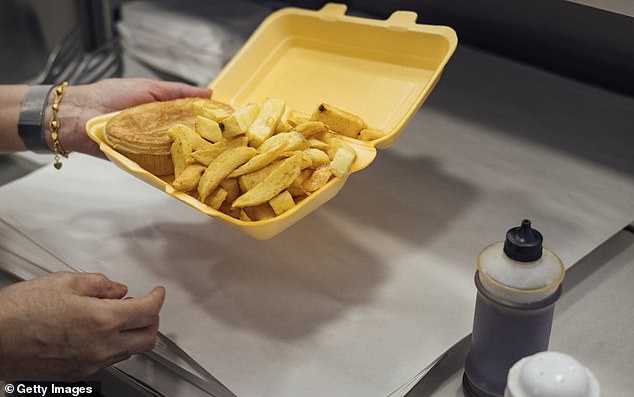As one of the quintessential British dishes, nearly 400 million portions of fish and chips are consumed annually.
And a portion of hot chips isn’t complete without a good shaking of salt, and lots of delicious vinegar sprinkled on top.
But many fast food lovers have been shocked to discover that the vinegar served at chippies is not, in fact, vinegar.
The majority of chip shops don’t use real vinegar, and instead use a cheaper alternative.
This cheaper version of the condiment, called a ‘non-brewed condiment’, is made from acetic acid, water and colouring.
While it may have the delicious flavour of its authentic counterpart, legally it cannot be called vinegar as it isn’t brewed from alcohol.
Not only is non-brewed condiment cheaper to make than real vinegar, it is also much quicker to make – and it has a longer shelf life.
And those who totally cut out alcohol from their diet can enjoy the alternative made from acetic acid, water and colouring – for example, those following a halal diet.

Many chip fans are only just learning that chip shop vinegar is often not actual vinegar – and instead is an alternative called ‘non-brewed condiment’ (stock image)
In addition it is usually gluten-free, unlike malt vinegar, which coeliacs and those with an intolerance have to avoid.
Chippies are able to buy a concentrated form of the condiment, which can then be diluted with water, before it is liberally splashed on delicious, hot piles of fried potatoes.
When LadBible shared an Instagram post revealing this vinegar news, people took to the comments section to share their thoughts.
Many were unconcerned about the provenance of the condiment, with one writing: ‘Sorry but chippy “vinegar” is the best, even if my whole life has been a lie.’
Another agreed, adding: ‘Still tastes better than any other vinegar I’ve had.’
However, it appears some are not fans of the punchy condiment, and prefer to use their own authentic option. One Instagram user wrote: ‘That’s why you never ask for salt and vinegar and put the proper stuff on at home!’





People had mixed reactions to the news, with some saying they love non-brewed condiment, and others preferring the real thing
In a similar vein, another added: ‘I prefer to do it at home with Sarsons Malt vinegar and my own rock salt.’
And a further social media user said: ‘Yes it’s not malted and should be illegal.’
While the news is a revelation to many, it first came to light in 2016, when YouTuber Tom Scott made a video about it, titled The Fake Vinegar In British Fish and Chip Shops.
In the video, which has been viewed more than five million times, he said: ‘Most people don’t know that this isn’t vinegar. Legally, it can’t be described as vinegar.
‘Trading standards are really clear on that. It cannot be put in the little bottles that people traditionally associate with vinegar.’
Share or comment on this article:
People are only just realising fish and chip shop vinegar isn’t actually vinegar